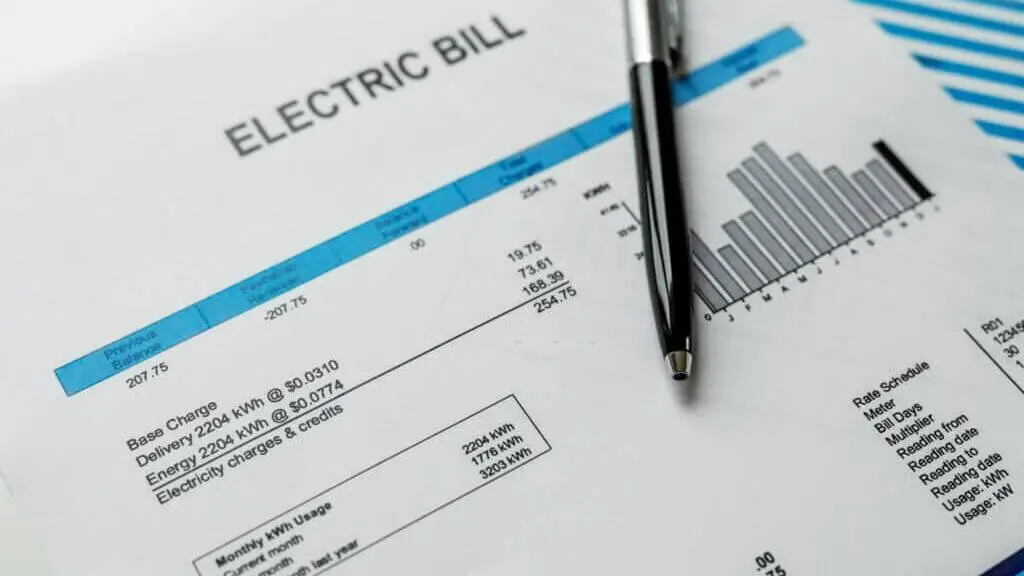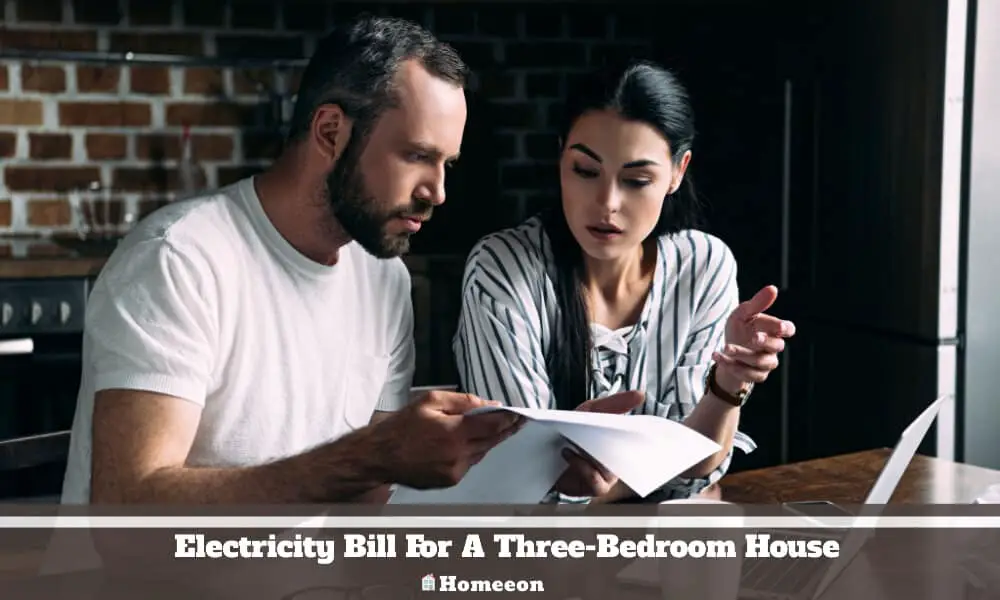Last Updated on August 7, 2023 By Emma W. Thomas
The average electricity bill for a three-bedroom house in the USA typically ranges from $100 to $200 per month. However, actual costs vary based on location, energy consumption, weather conditions, and individual utility rates.
The Average Electricity Bill For A Three-Bedroom House
| Location | Average Monthly Electricity Bill (USD) | Notes |
|---|---|---|
| Northeast | $150 – $250 | Higher costs due to colder winters and higher population density. |
| Midwest | $100 – $200 | Moderate costs with varying weather conditions. |
| South | $100 – $180 | Lower costs due to milder winters and lower utility rates. |
| West | $120 – $220 | Costs influenced by climate and population density. |
| National Average | $120 – $210 | Overall average considering all regions and factors. |
Examples of the monthly average of electricity bills per state in 2023
| States | Average Monthly Electricity Bill |
| Washington, Louisiana, Arkansas, Idaho, North Dakota | Under $150 |
| Connecticut | $165.32 |
| New Mexico | $75.28 |
| Hawaii, Alaska, Rhode Island, Massachusetts | $160 |
The average electric bill for a three-bedroom house also depends on the number of occupants in the house.
Average Electricity Bills Per Size Of The Household
| Number Of Occupants | Average Electricity Bill (Annual) |
| one | $1,273 |
| two | $1,509 |
| three | $1,737 |
| four | $1,901 |
To determine the average electricity bill for your house, you need to consider the cost for your area and usage according to your home’s size. The electricity bill per square foot of a home ranges from $0.7 to $0.10 on average.
What Uses The Most Electricity in a Three-Bedroom House in the USA?
In a three-bedroom house in the USA, several appliances and devices can contribute to high electricity consumption. The top electricity-consuming items are typically as follows:
- Heating and Cooling Systems: HVAC (Heating, Ventilation, and Air Conditioning) systems are the biggest energy consumers, especially during extreme weather conditions. Central air conditioning, electric furnaces, and electric heaters can significantly impact electricity bills.
- Water Heater: Water heaters, especially older models or those with large tanks, can use a considerable amount of electricity to heat water for showers, washing dishes, and laundry.
- Refrigerator and Freezer: Refrigerators and freezers run constantly to keep food fresh and frozen. Older or less efficient models can consume more electricity.
- Washing Machine and Dryer: These appliances use significant electricity, particularly if they are older models or if the dryer is electric rather than gas-powered.
- Lighting: Lighting throughout the house can add up, especially if incandescent bulbs are still in use. LED bulbs are more energy-efficient alternatives.
- Cooking Appliances: Electric stoves, ovens, and microwaves can contribute to electricity consumption during meal preparation.
- Electronics and Devices: TVs, computers, gaming consoles, chargers, and other electronic devices left on standby mode can collectively draw a notable amount of power.
- Air Fans: While not as significant as heating and cooling systems, running fans constantly or using air circulators can still impact electricity usage.
What Leads To High Electric Bills?

While you may sometimes blame your service provider for high electricity bills, it is necessary to check on your usage. The following factors may lead to high bills if not put in check:
Leaving Your Appliances Plugged On
Most modern devices and appliances consume electricity even when turned off if you leave them plugged in. Modern technology does not power down, and when your television, computer, DVR, have their ‘power’ button on, this transitions to a standby mode. The reason for this is that the device can easily be turned on for further use.
When these gadgets stay idle, they continue to use electricity as they await a scheduled task to run. Any device with a timer, such as coffee makers and microwave ovens, requires power to keep the time even when they are off. This requirement applies even to older technologies like VCRs.
Using Large Appliances
Large devices such as clothes washers, dryers, and dishwashers, consume much electric energy if used frequently. If the dishwasher is not full, if it uses the wrong wash cycle, or if the drying setting is not using low or no heat, your electricity bill will go up. You can correct this anomaly by reducing the number of laundry days per week, filling your loads, and setting low heat for drying.
Using Ancient Devices
Your electricity bill could be going up due to the usage of devices that are past their prime. Old gadgets use a lot of electric energy in comparison with new energy-efficient ones. For example, old-model ovens and refrigerators (even if they are trendy and cute) will drive up your electricity bill.
Charging Devices Frequently
Devices such as cell phones, iPads, tablets, PCs, MP3 players, laptops, and electric toothbrushes, among others, consume electric energy when charging. The more gadgets you have, the more likely you will plug them in, leading to high bills.
Depending on the number of occupants in your house and the devices each one has, the electric energy consumption will be high.
Misuse Of Ceiling Fans And Lights
If you leave lights on in the rooms you are not currently using, it leads to unnecessary electricity usage. Leaving ceiling fans on when there is no one in the room will also contribute to high bills, which you could otherwise avoid.
How Can You Lower Your Electricity Bill?
Your electricity bill depends highly on the appliances and devices you use and the frequency of usage. Your refrigerator may contribute to higher energy consumption. Other small appliances such as television, lights, and hair dryers will add to the charges if used frequently.
You can control your power usage and reduce your monthly bill by employing simple energy-efficient strategies such as:
Correct Insulation
Your house loses a lot of heat in the winter and gains a lot in the summer if it is not adequately insulated. With proper insulation, you will not need to blast your AC or heater during winter. It will also help prevent your water heaters from losing heat and eventually lead to lower energy consumption and reduced bills.
Energy-Efficient Devices
Older electrical appliances may consume more energy than you can imagine. It is necessary to replace your older appliances with energy-efficient ones to minimize consumption and reduce the charges.
Idle Power Usage

You can cut down the electric energy usage by unplugging devices that you are not using. Plugged electrical appliances may still consume energy even if they are turned off. Ensure that you also turn off unnecessary lights, as doing this will also help minimize charges. You may also switch from incandescent bulbs to LED which is a great way of minimizing electricity bills.
Try to connect your appliances to power strips and turn off the strips when the devices are not in use. Doing this disconnects the gadget from the power source and helps minimize electric energy usage.
You may also opt for natural lights by building your windows facing south. Doing this helps to illuminate a lot of your area, and you may not need to put on your lights during the day. Another alternative will be to turn off ceiling lights and track lighting, under counter lights, and table lamps in hobby and work areas and your kitchen.
Taking Shorter Showers
It is expensive to heat shower water. If you reduce the amount of time you spend when taking a shower, it will help save some dollars per year on the bill.
Unplug Chargers And AC Adapters
When your AC adapters and chargers are not in use, make sure they are not plugged into the sockets. These gadgets will still pull electricity even when they are not charging a device. Avoid charging your appliance unnecessarily, as doing this will not only lead to higher bills but also damage your device’s battery.
References:
https://www.ecoenergygeek.com/average-electricity-bill-3-bedroom-house/
https://getflex.com/blog/the-average-electric-bill-for-3-4-bedroom-houses/
Emma is a graduate of Domestic Science or Family and Consumer Sciences (Home Economics) from the University of Wisconsin. She has 7 years of experience Working with the strategic section of BestBuy and now writing full-time for Homeeon.
From Managing the Home, Interiors, Cleaning, and Exteriors to Gardening and everything about Making A Home Liveable – is her passion and this Homeeon is the result of this.
Emma loves decorating her home with the best stuff found online. She cares about quality over anything and writes reviews about them here in Homeeon. Get in touch with her over Pinterest.
Keep reading her blogs.
